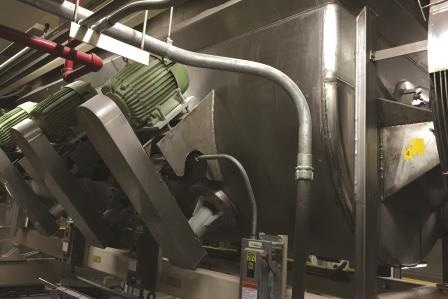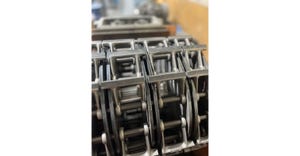February 6, 2017

For a mixer that processes 15,000 lb of dry mix every hour, a leaking seal that requires replacement every six months is costly. These high costs include lost product, extensive maintenance, increased downtime, and safety hazards. Multiply these losses by 10 mixers, each operating three shifts a day, five days a week, and the accumulated losses become unsustainable.
At a food manufacturing facility in Toledo, OH, leaking mixers were losing 830 lb/415 boxes of pancake mix every week.
The facility uses mixers that have six CO2 lines for cooling the hot oil that enters the mixer, as well as preventing the chocolate chips from melting. After six months of operation, the mixer’s original seals started leaking the dry pancake mix and needed to be replaced. An equipment analysis determined that the contact seals failed because they could not accommodate the shaft-to-bore misalignment (STBM) with tight clearances. Over a short time, wear on the seal faces caused a gap that allowed product to escape to atmosphere, making the contact seal ineffective.
Maintenance associated with the leaks added up. Each day, on each of the three shifts, plant personnel spent 20 minutes cleaning up the leaking dry mix, totaling five extra maintenance hours per week. All the leaked dry mix had to be thrown out, increasing product costs. Every six months, two team members spent eight hours on each mixer replacing the seals. Each seal replacement cost approximately $6000. Over the course of the year, the failing seals created 290 man hours of work; 160 of those were also lost production hours. Additional production time was lost when conveyors shut down due to the leaking dry mix dust falling below the mixer and accumulating on the conveyor sensors.
The manufacturing plant sought a more durable solution for its mixers. The company turned to Ivanne Spooner, a technical salesperson for Galloup and local distributor for Inpro/Seal custom-engineered bearing protection and process seals. Spooner suggested Inpro/Seal Air Mizer (AM) Solutions shaft seals, which can handle STBM and shaft angularity to the housing face. Given the seals’ ability to handle extreme amounts of shaft movement and the proven success of AM Solutions shaft seals in sealing the plant’s sugar conveyors, the company decided to move forward with the upgrade.
Eliminating Leakage with Air Seals
AM Solutions shaft seals seal against product loss and contamination by directing a small amount of air through a precision clearance between the seal and the shaft, pressurizing the clearance. The air is directed toward the product and atmosphere equally.
To seal the mixers, plant air was delivered to the seal at 13 psi. By using plant air, the seal avoids additional operating expense.
AM Solutions shaft seals can fully articulate to accommodate radial run-out, axial movement, and angular misalignment simultaneously, making this the perfect solution for the mixers. As non-contacting seals, AM Solutions shaft seals are designed to last the lifetime of the mixer.
The food manufacturing plant chose a split AM food-grade design. The AM food-grade design is constructed of FDA-approved materials and elastomers for use in food processing facilities, and the split design allows for easy installation.
Success Summary
Since September 2014, AM Solutions shaft seals have been installed on eight of the facility’s 10 mixers. After two years, they had not experienced any degradation of seal performance. AM Solutions shaft seals are saving the plant $18,750 per mixer each year, or $112,500 across the six mixers installed with AM Solutions shaft seals.
Todd Hearty is regional manager, Inpro/Seal, a designer and manufacturer of system and bearing protection products. For more information, visit www.inpro-seal.com.
Click here for information about the PBS Toronto event, May 16-18, 2017
For more articles, news, and equipment reviews, visit our Accessories Equipment Zones
You May Also Like


